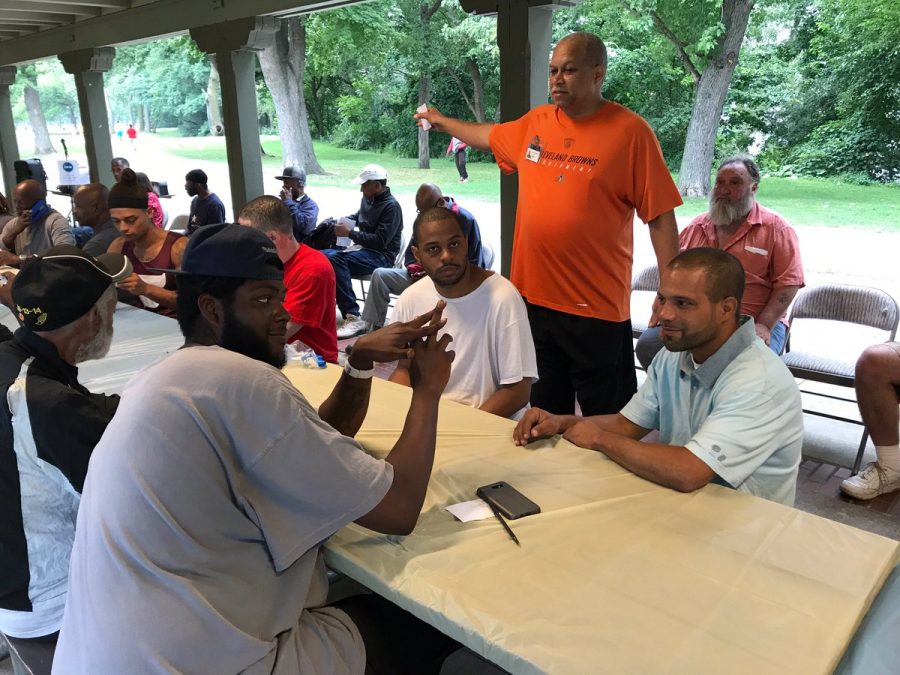Cai: Burst out of the bubble
Courtesy Lutheran Metropolitan Ministry Twitter
An organizer directs residents at the Lutheran Metropolitan Ministry Homeless Shelter. Case Western Reserve University students should look outside of campus for opportunities to serve the community.
“Case is a bubble.” This is something I have repeatedly heard since the first day of school. On campus tours, during orientation, in class…people usually say this to reassure one another that no matter how miserable outsiders think Cleveland is, Case Western Reserve University has nothing to do with this outsider perception.
When I first traveled to East Cleveland a few weeks ago, I was surprised how a few blocks away from the well-kept campus where we have classes every day, the scene was so different. When the cashier in Family Dollar asked me to leave my bag at the front door so he could make sure I didn’t steal anything, and when I walked by a guy standing by the front door asking everyone entering if they wanted drugs, it came as a huge culture shock. More interestingly, when I tried to call SafeRide to get back to school, I couldn’t get one because I was obviously too far from the “bubble”.
Last week I went to Lutheran Metropolitan Ministry’s Men’s Homeless Shelter to discuss my volunteer interest. I looked out of the window and watched slowly the landscape change, as the fancy restaurants and bars of Uptown disappeared and the buildings got more scarce. It was shocking how 20 minutes away from campus, the view was so different.
The shelter holds more than 4,000 men each year. Most of them have suffered from trauma, mental problems and physical pain, and a small percentage have committed felonies.
The Rev. Lydia Bailey, the volunteer coordinator, warned me to be careful of stereotypes of homeless people, such as the perception that they choose their homelessness. She emphasized how for many homeless people, there are few opportunities to advance throughout their lives. In comparison, big corporations flood into CWRU every year to recruit new graduates. Few of them would look to give a similar opportunity to someone with a lower education level, let alone a track record of misdemeanors.
There have been various events drawing our attention lately: The hurricanes, the events in Charlottesville and the Las Vegas shooting. However, few of us talk about the fact that Cleveland is in the second-most poverty-stricken major county in the US, with a 53% adult unemployment rate. Bailey wrote an opinion piece of her own, “A dream of spring among Cleveland’s most distressed citizens.” We citizens are much more easily alarmed (and consequently, moved to action) by immediate threats than by long-lasting problems. Even when those problems are just a few blocks away from where we live. It’s easier to tackle short-term problems that have more easily available solutions. We are demotivated when whatever we do seems trivial in the face of a tough, decades-long situation.
However, as Marian Wright Edelman, CWRU’s 2017 Inamori Prize Recipient, mentioned in her acceptance speech, we cannot let the notion that we can not do enough keep us from doing anything. Even if we can happily and conformably live in the bubble, we can choose to jump out of it.
To me, college may be the cradle of knowledge, but it should never block out humanity. Every university holds some degree of social responsibility. This responsibility includes equipping students with the skills to identify solutions to the largest societal issues and use their knowledge and resources to make life better for those who are less fortunate. College is not about isolating us from the real world. It’s about teaching us to better perceive the world we live in, accept how imperfect it is and try to make it a better place. No one individual can ever do enough, but together we could be an incredible force.
As an anthropology student, I have always been impressed by the complexity of humanity, and to what degree we can understand that. I am intrigued by how everything is interconnected and how I might be able to invoke change by studying the roots of problems and understanding how to initiate a series of changes.
Bailey writes that she has seen a lot of people “compelled to act” by their belief and their sense of obligation. As college students, I believe we should be compelled by the duty our education has endowed upon us. Imagine the joy you would feel if what you study, what you are passionate about, had a meaningful impact on other people’s lives. Jump out of the bubble.
Yingying Cai is a first-year anthropology major.


